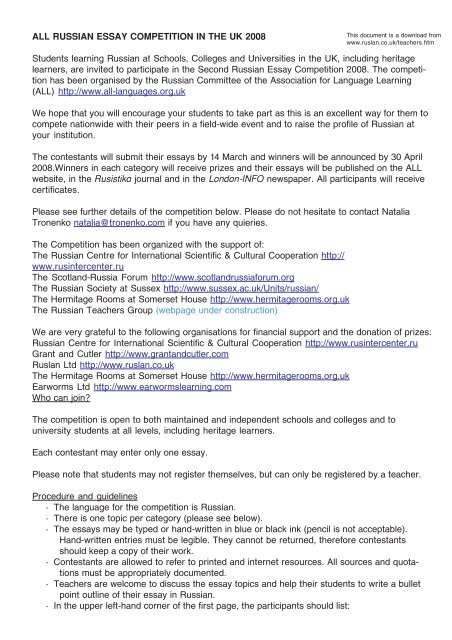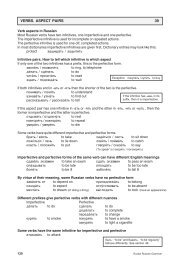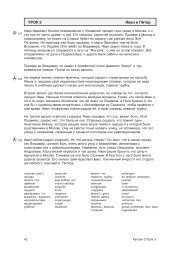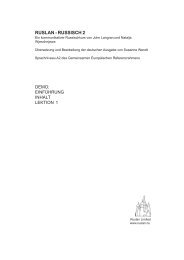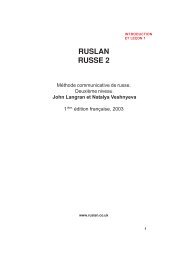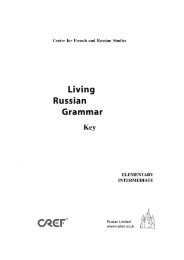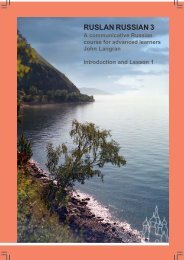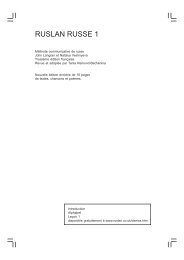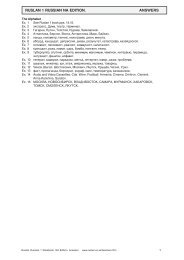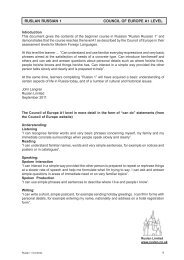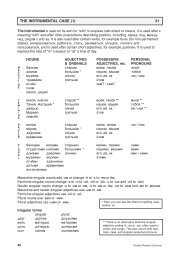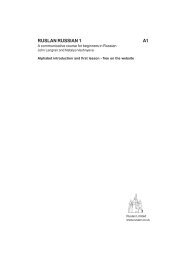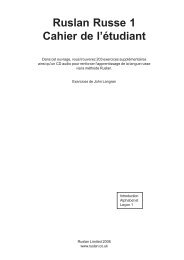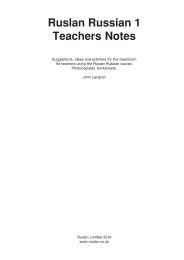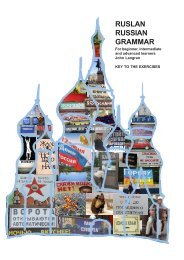ALL RUSSIAN ESSAY COMPETITION IN THE UK 2008 Students ...
ALL RUSSIAN ESSAY COMPETITION IN THE UK 2008 Students ...
ALL RUSSIAN ESSAY COMPETITION IN THE UK 2008 Students ...
You also want an ePaper? Increase the reach of your titles
YUMPU automatically turns print PDFs into web optimized ePapers that Google loves.
<strong>ALL</strong> <strong>RUSSIAN</strong> <strong>ESSAY</strong> <strong>COMPETITION</strong> <strong>IN</strong> <strong>THE</strong> <strong>UK</strong> <strong>2008</strong><br />
This document is a download from<br />
www.ruslan.co.uk/teachers.htm<br />
<strong>Students</strong> learning Russian at Schools, Colleges and Universities in the <strong>UK</strong>, including heritage<br />
learners, are invited to participate in the Second Russian Essay Competition <strong>2008</strong>. The competition<br />
has been organised by the Russian Committee of the Association for Language Learning<br />
(<strong>ALL</strong>) http://www.all-languages.org.uk<br />
We hope that you will encourage your students to take part as this is an excellent way for them to<br />
compete nationwide with their peers in a field-wide event and to raise the profile of Russian at<br />
your institution.<br />
The contestants will submit their essays by 14 March and winners will be announced by 30 April<br />
<strong>2008</strong>.Winners in each category will receive prizes and their essays will be published on the <strong>ALL</strong><br />
website, in the Rusistika journal and in the London-<strong>IN</strong>FO newspaper. All participants will receive<br />
certificates.<br />
Please see further details of the competition below. Please do not hesitate to contact Natalia<br />
Tronenko natalia@tronenko.com if you have any quieries.<br />
The Competition has been organized with the support of:<br />
The Russian Centre for International Scientific & Cultural Cooperation http://<br />
www.rusintercenter.ru<br />
The Scotland-Russia Forum http://www.scotlandrussiaforum.org<br />
The Russian Society at Sussex http://www.sussex.ac.uk/Units/russian/<br />
The Hermitage Rooms at Somerset House http://www.hermitagerooms.org.uk<br />
The Russian Teachers Group (webpage under construction)<br />
We are very grateful to the following organisations for financial support and the donation of prizes:<br />
Russian Centre for International Scientific & Cultural Cooperation http://www.rusintercenter.ru<br />
Grant and Cutler http://www.grantandcutler.com<br />
Ruslan Ltd http://www.ruslan.co.uk<br />
The Hermitage Rooms at Somerset House http://www.hermitagerooms.org.uk<br />
Earworms Ltd http://www.earwormslearning.com<br />
Who can join?<br />
The competition is open to both maintained and independent schools and colleges and to<br />
university students at all levels, including heritage learners.<br />
Each contestant may enter only one essay.<br />
Please note that students may not register themselves, but can only be registered by a teacher.<br />
Procedure and guidelines<br />
· The language for the competition is Russian.<br />
· There is one topic per category (please see below).<br />
· The essays may be typed or hand-written in blue or black ink (pencil is not acceptable).<br />
Hand-written entries must be legible. They cannot be returned, therefore contestants<br />
should keep a copy of their work.<br />
· Contestants are allowed to refer to printed and internet resources. All sources and quotations<br />
must be appropriately documented.<br />
· Teachers are welcome to discuss the essay topics and help their students to write a bullet<br />
point outline of their essay in Russian.<br />
· In the upper left-hand corner of the first page, the participants should list:
1. The name of the school or university.<br />
2. The name of the teacher.<br />
3. The name of the participant.<br />
4. The category and level (please consult the criteria below).<br />
· The last page should be signed by the entrant’s teacher to verify that the essay is solely<br />
the work of the student concerned. Essays which do not include this information will not<br />
be read.<br />
· After the students write their essays, teachers should make three copies of each essay.<br />
· Teachers must attach the entry forms (please see below) to the originals, one entry form<br />
per student.<br />
Sending essays<br />
· The essays should be submitted to Natalia Tronenko either by post to 59 Wandsworth<br />
Common West Side, London SW18 2ED or by e-mail to natalia@tronenko.com.<br />
· Teachers should send:<br />
1. one entry form per entrant (attached to the original);<br />
2. the originals; and<br />
3. three photocopies (if the essays are hand-written).<br />
· For Level 1entrants who prepare posters, only the original is required along with the<br />
entry form attached to the back of their poster.<br />
· Please write “<strong>ALL</strong> Russian Essay Competition” on the envelope and/or as the subject of<br />
your e-mails.<br />
Deadlines<br />
The deadline for submitting the essays is 14 March. Judges will review the essays in March<br />
and April and winners will be announced by 30 April <strong>2008</strong>.<br />
Criteria for Judging the Essays<br />
Essays will be reviewed by the panel of judges. The work must be entirely the student’s own.<br />
What our judges are looking for, above all, is originality of thought and clarity of expression.<br />
More specifically, their judgement will be based on content (the ability to express original and<br />
creative ideas in Russian and communicate information about the Competition topic) and the<br />
accuracy and effectiveness of students’ presentation (grammatical and orthographic accuracy,<br />
range of vocabulary, syntax structure and organisation of the text). The decision of the judges<br />
is final.<br />
What happens after the Competition?<br />
The winners will be announced by 30 April <strong>2008</strong>. Winners in each category will receive prizes<br />
and their essays will be published on the <strong>ALL</strong> website, in Rusistika magazine and in London-<br />
<strong>IN</strong>FO newspaper.<br />
Winning entrants will be asked to submit an electronic copy of their essays for publication on<br />
the <strong>ALL</strong> web site.<br />
Categories
Please take time to calculate the number of hours that your students have studied Russian to<br />
place them in the proper category and level. Essays will be ranked according to categories as<br />
follows:<br />
Category 1. Non-heritage learners at Schools and Colleges who do not speak Russian with<br />
their families at home.<br />
Level 1.<br />
<strong>Students</strong> in their first year of study, i.e., students of ab initio level. (Please note that heritage<br />
learners of any Slavic language, including Russian, are not allowed to participate in this category<br />
of the contest.)<br />
Level 2.<br />
<strong>Students</strong> who at the time of the essay contest will have had more than 100 but less than 200<br />
contact hours of instruction in Russian. (Please note that heritage learners of any Slavic language,<br />
including Russian, are not allowed to participate in this category of the contest.) This is<br />
mostly students at Post-Beginners’ Level.<br />
Level 3.<br />
<strong>Students</strong> who at the time of the essay contest will have had more than 200 but less than 300<br />
contact hours of instruction in Russian. This is mostly school students working towards GCSE<br />
level.<br />
Level 4.<br />
<strong>Students</strong> who at the time of the essay contest will have had up to 400 contact hours of instruction<br />
in Russian. This is mostly school students working towards their A-level.<br />
Category 2. Non-heritage learners at Universities who do not speak Russian with their families<br />
at home.<br />
Level 1.<br />
<strong>Students</strong> in their first year of study, i.e., students of ab initio level. (Please note that heritage<br />
learners of any Slavic language, including Russian, are not allowed to participate in this category<br />
of the contest.)<br />
Level 2.<br />
<strong>Students</strong> who at the time of the essay contest will have had more than 100 but less than 200<br />
contact hours of instruction in Russian. (Please note that heritage learners of any Slavic language,<br />
including Russian, are not allowed to participate in this category of the contest.) This is<br />
mostly students at Post-Beginners’ Level.<br />
Level 3.<br />
<strong>Students</strong> who at the time of the essay contest will have had more than 200 but less than 300<br />
hours of instruction in Russian.<br />
Level 4.<br />
<strong>Students</strong> who at the time of the essay contest will have had up to 400 contact hours of instruction<br />
in Russian.
Category 3. Heritage learners who speak Russian with their families at home.<br />
Level 1.<br />
Heritage learners of 11 years and under who have NOT attended school in Russia or the<br />
former Soviet Union and have learnt reading and writing skills after emigration.<br />
Level 2.<br />
Heritage learners of 12 years and over who have NOT attended school in Russia or the former<br />
Soviet Union and have learnt reading and writing skills after emigration.<br />
Level 3.<br />
Heritage learners of 11 years and over who have attended school in Russia or the former Soviet<br />
Union.<br />
Topics<br />
Categories 1 and 2: Non-Heritage Learners<br />
Level 1: A poster on a theme:<br />
×óäåñíàÿ ðóññêàÿ çèìà.<br />
The great Russian winter.<br />
The poster should contain words and/or phrases in Russian.<br />
Level 2: 80-100 words.<br />
What I like about today’s Russia.<br />
×òî ìíå íðàâèòñÿ â ñîâðåìåííîé Ðîññèè.<br />
Level 3: 150-180 words.<br />
A day in the life of a Russian oligarch.<br />
Îäèí äåíü èç æèçíè ðóññêîãî îëèãàðõà.<br />
Level 4: 200-250 words.<br />
Famous Russians in the <strong>UK</strong> (historical or contemporary).<br />
Èçâåñòíûå ðóññêèå â Âåëèêîáðèòàíèè.<br />
A few suggestions: Peter the Great, Alexander Herzen, Lenin, Pyotr Kapitsa, Tamara<br />
Karsavina, Rudolf Nureyev, Oleg Prokofiev, Natalia Vodianova, Boris Berezovsky, Roman<br />
Abramovich, Dmitry Hvorostovsky.<br />
A useful link: http://en.wikipedia.org/wiki/British_Russians<br />
Category 3: Heritage learners<br />
Level 1: 100-120 words.<br />
A letter to my favourite character from a Russian fairy-tale or story.<br />
Ïèñüìî ìîåìó ëþáèìîìó ãåðîþ èç ðóññêîé ñêàçêè èëè ðàññêàçà.<br />
Level 2: 150-180 words.<br />
If I went to Russia I’d like to meet ....<br />
Åñëè áû ÿ ïîåõàë(à) â Ðîññèþ ÿ õîòåë(à) áû âñòðåòèòüñÿ ñ ...<br />
Level 3: 200-250 words.<br />
What I miss most about Russia.<br />
Ïî ÷åìó èç ìîåé æèçíè â Ðîññèè ÿ ñêó÷àþ áîëüøå âñåãî.
<strong>THE</strong> SECOND <strong>RUSSIAN</strong> <strong>ESSAY</strong> <strong>COMPETITION</strong> <strong>IN</strong> <strong>THE</strong> <strong>UK</strong> <strong>2008</strong><br />
ENTRY FORM<br />
This document is a download from<br />
www.ruslan.co.uk/teachers.htm<br />
School /University<br />
Name & Address<br />
________________________________________<br />
________________________________________<br />
________________________________________<br />
Teacher/Contact<br />
Name<br />
E-Mail Address<br />
Telephone<br />
Entrant’s Name<br />
________________________________________<br />
________________________________________<br />
________________________________________<br />
________________________________________<br />
________________________________________<br />
Entrant’s Age/Year Group<br />
Category and Level<br />
___________________________<br />
___________________________<br />
Comments (optional)<br />
Date<br />
___________________________


